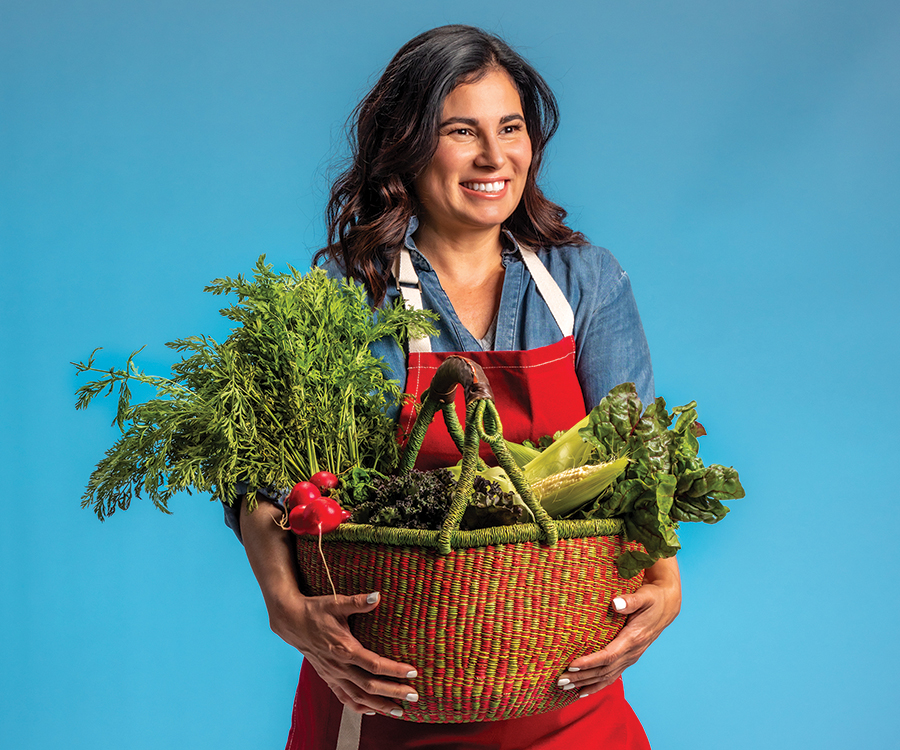
Jo Lerma-Lopez and other local chefs promoted plant-based cooking for Holiday reFresh, one of the online events in Acterra’s Healthy Plate, Healthy Planet program that seeks to decrease the carbon footprint of food. Photo courtesy Acterra.
The COVID-19 pandemic has restructured the way Bay Area residents eat, with more people ordering groceries and prepared food online, more people cooking at home, and many people increasingly concerned about how much their food costs. Organizations and agencies concerned about climate change are hoping that as people adopt new ways of thinking about food, they will consider moving to a healthier diet, not just for themselves but for the planet. Less meat, dairy, or eggs can slim waistlines and also lower greenhouse gas emissions. In a region where wildfires are becoming an annual reminder of the impacts of climate change, grocery carts and carry-out menus may be ways for diners to fight back.
“Our food system is part of the climate problem,” declared University of Aberdeen professor Pete Smith in a virtual August 12 lecture for Acterra, a Palo Alto nonprofit that works on creating local solutions to environmental problems. Specifically, Smith was addressing the fact that greenhouse gas emissions from putting meat on the table are significant, particularly for beef and lamb, but also for dairy products, pork, and poultry. He cited a 2018 Science study that showed 26 percent of the world’s emissions are from food, 58 percent of those food emissions are from animal products, and 50 percent of the emissions from farmed animals are from cattle and sheep.
Simply put, the larger the animal, the larger the emissions problem. Cattle, especially, require large amounts of feed, which must be grown, harvested, and transported if animals are not grass-fed. They also generate a lot of manure, which is rich in methane and produces nitrous oxide when stored and used as fertilizer. Cattle and sheep are both ruminants, animals that digest plants through enteric fermentation, which generates internal methane-bearing gases that are then emitted from both ends of the digestive system. Other meat sources, primarily pigs and poultry, emit less methane but also contribute to nitrous oxide emissions directly through their waste and indirectly from the fertilizer used on raising soybeans and corn for their feed.

Pete Smith delivered a virtual lecture about food and climate for Acterra on August 12. Photo courtesy the University of Aberdeen.
While it may seem that the answer is to turn to pasture-raised beef and free-range poultry, these practices require more land than the feedlots, stalls, and cages used for “factory farming.” The demand for meat is growing worldwide as wealth and population increase, but studies indicate that there simply isn’t enough suitable land to meet that demand with less intensive meat-production methods. In an early study of this issue, David Pimentel of Cornell University concluded that “if all the U.S. grain now fed to livestock were exported and if cattlemen switched to grass-fed production systems, less beef would be available and animal protein in the average American diet would drop from 75 grams to 29 grams per day.” Experiments on whether pasture grazing and manure spreading can lower emissions and sequester carbon in the soil demonstrate that here too there are scientific limits, in this case to the soil’s capacity to hold carbon. In his Acterra lecture, Smith commented, “There are many reasons to choose grazed livestock, but climate is not one of them.”
These global considerations set the stage for local actions. Although the numbers vary by community, a 2015 UC Berkeley study showed that the average Bay Area household generates over eight metric tons per year of carbon-dioxide-equivalent greenhouse gases from the food that it uses, almost half of that from meat and dairy. Abby Young, climate protection manager with the Bay Area Air Quality Management District, gently suggested, “It would be really good if we all cut back a little.” Young is involved in the agency’s Climate and Food program, which is focusing on the ways that better food choices and less food waste can reduce those eight metric tons per year. Through a partnership with Acterra’s Healthy Plate, Healthy Planet program, the agency is promoting a “plant-forward” approach to eating.
“Plant-forward” diets offer variety and do not necessarily have to be vegetarian or vegan. As Smith remarked, “the decision never to eat meat again is very binary,” and people who can’t imagine such a choice may be encouraged to know that simply lowering meat consumption can achieve significant changes. Smith quoted a 2009 study that concluded that including fewer animal products in the global diet allows everyone to be fed, and land is made available for energy and nature conservation.
In the Bay Area, a region with great diversity and a strong interest in good eating, it’s easy to find ways to be more plant-forward. Many residents are already well on their way. Some have consciously chosen to designate one day a week as a plant-forward day, a concept promoted by the organization Green Monday, and its partner Meat Free Monday, founded by Sir Paul McCartney.
Others are eating more plant-based foods because those dishes are on the menus of favorite restaurants. Holiday reFresh, a November 1 Healthy Plate, Healthy Planet webinar, starred well-known chefs from around the region presenting plant-based dishes for festive meals. Viewers may have been tempted by the Gumbo Z’herbes available at Brown Sugar Kitchen, or plan to recreate the Wild Mushroom Hot Pot from Mister Jiu’s for a family dinner at home.
Sometimes a few small tweaks — such as replacing cow’s milk with coconut milk — can change a traditional dish to a healthier, more climate-conscious version. Acterra’s new online Facebook community is sharing recipes, tips for buying ingredients, and reviews of local eateries with plant-forward menu items.
The Holiday reFresh panel drew from many cultures that already use plant-based dishes or plant-forward menus. Asian, Mexican, Native American, Creole, and apple-pie American were all represented.
For other food traditions, the changes may be more substantial, but even more worthwhile. Jasmine Leyva’s film The Invisible Vegan was the topic of an earlier Healthy Plate, Healthy Planet webinar (the webinars are all available to watch on YouTube). The film focuses on how Black people can reclaim their African and Caribbean cultures of plant-based eating and move away from traditional soul food, which is heavy on meat and sugar.
In the film, Leyva and others discuss the strong impact that animal products can have on land, water, and climate change, as well as on personal health. Panelists in the Acterra webinar, including Leyva, also explored some of the issues around eating less meat and dairy, including humane treatment of animals, concern for working conditions in the meat-raising industries, and addressing environmental racism that restricts access to healthy foods for low-income communities.
They also discussed some of the barriers, perceived or real, to realigning the way people choose to eat. lauren (sic) Ornelas, founder of the Food Empowerment Project, reported that “preaching to people drives them away — they say, ‘Let me come to this my own way.’” She stressed that although she did have to learn to like new flavors, there are foods that she would otherwise never have tried, such as Ethiopian, which she really enjoys.

GW Chew participated in Acterra’s panel discussion on The Invisible Vegan. Photo courtesy Acterra.
Several panelists mentioned the issue of affordability, particularly for communities in “food deserts” where fresh foods may be hard to obtain. GW Chew, aka “Chef Chew,” doesn’t see this as critical. “If you have the desire to cook, going vegan can be done pretty cheaply,” he asserted. “Beans, rice, pasta aren’t expensive. A bag of beans is one dollar, and that can probably give you six to eight servings — but it’s work!”
Chew’s Oakland-based company, Something Better Foods, is making plant-based “meat.” He explained that because plant ingredients are cheaper than raising animals, “in a few years, plant-based proteins will be the same price as meat.” Asked about “cell-based meat,” which produces animal protein in manufacturing facilities instead of from livestock, Chew responded, “That will reduce ethical issues — animals are not going to be killed — and the environmental issues, but it will not solve the health issues. It’s a better step, but not the best step. Plant-based is the most natural form.”
Whatever the argument — personal health, animal cruelty, social justice, racial empowerment, or environmental impacts — there are many factors driving a shift away from meat and dairy as they are currently consumed. The vegan and vegetarian communities have been making many of these points for years, but the issue of climate disruption is an important addition to the list.
Leyva remarked, “I don’t think people think about food a lot of the time. When I grew up, it was just a habitual act that I didn’t know held any particular power.” As she and others are coming to realize, that simple daily act does hold power, and it’s there for everyone to wield, at the end of their forks.
Leslie Stewart covers air quality and energy for the Monitor.

